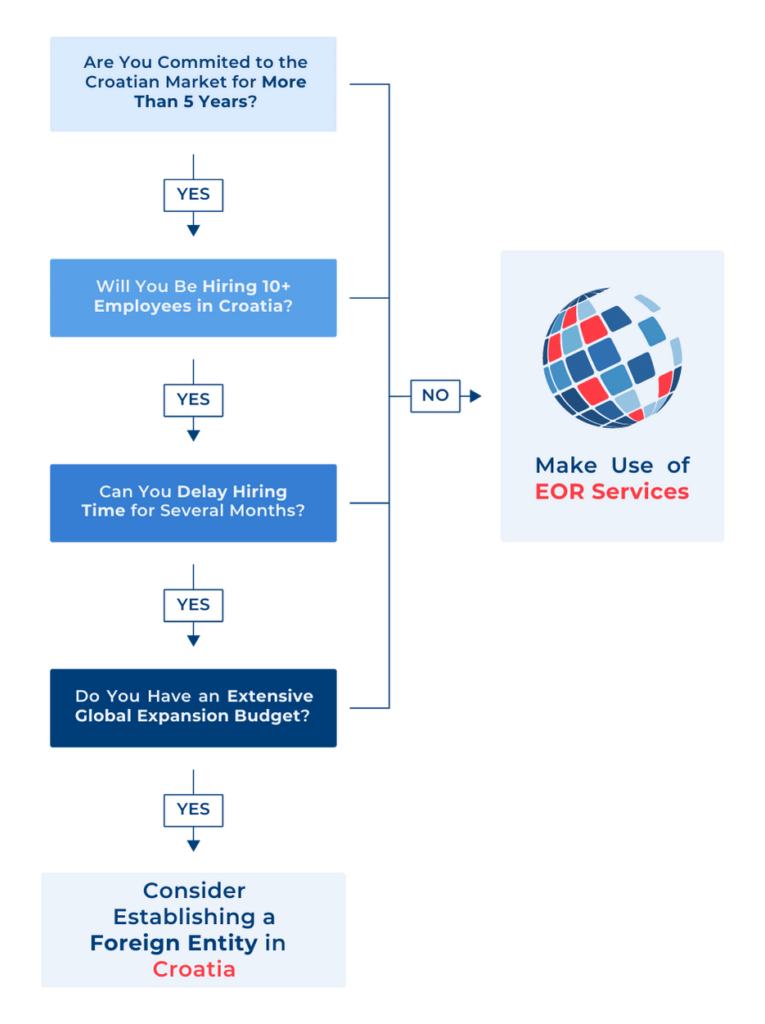
Testimonial
Manuel Ramos
TERAO ASIA
Managing Director
We think INS Global is a good solution about starting in a market like China. Understanding the market doesn’t mean you need to set up a company immediately.
5/5
PEO in Croatia is easier than you might think.
You’re looking for a reliable partner for entering new markets, INS Global is fully equipped to ensure a speedy and secure expansion. For over 15 years INS Global has been assisting companies of all sizes to expand across the world. Now, our PEO in Croatia and our experienced team of global expansion services experts can offer personalized solutions for any obstacles that might arise.
With a PEO in Croatia, you can easily bring over your staff team and begin operations in the new market quickly and efficiently.
Similarly, a Professional Employer Organization (PEO) can help you handle administrative tasks like contract management, payroll taxes, etc. Having a PEO partner reduces the chance of risk and legal errors and makes global expansion a reality in record time.
A new market means a new and unfamiliar legal system. Making mistakes with employment and labor law can often result in high fees and fines. Having a PEO’s legal team on hand always keeps both your company and your employees legally secure.
A PEO covers every aspect of payroll and HR services so that you don’t need to outsource your problems to multiple providers.
With a PEO you have less to worry about, more time to lead your team, and more chances to move closer to your market goals. A PEO partner gives you space and energy to prioritize the tasks that only you can do.
Traditional company incorporation can take weeks or months before your staff can start working. A PEO can have you up and running in just a few days.
Through a single platform designed to be as simple as possible, a PEO provides recruitment, onboarding, payroll, and HR services, plus ongoing support.
Traditional company incorporation may be a time-tested method, but it’s outdated in today’s evolving and highly competitive business world. With company incorporation, you have to go through the process of setting up a branch or subsidiary all on your own in an unfamiliar system. This involves lots of paperwork and potential complications.
Alternatively, a PEO streamlines the process by acting as the legal entity so that you can enter the new market swiftly and safely.
A PEO also provides:
The Advantage in Figures
PEO/EOR
Company Incorporation
Price
80% Less Expensive
Market Entry
2-5 Days
6 Months


Manuel Ramos
TERAO ASIA
Managing Director
We think INS Global is a good solution about starting in a market like China. Understanding the market doesn’t mean you need to set up a company immediately.
With a simple four-step plan INS Global can streamline and accelerate your international expansion strategy.
While a PEO and EOR are often mentioned together, the services that they offer differ in important ways. Before deciding to partner with one, you should learn about their differences so you can choose the one that’s best suited to your needs.
The cost of expert EOR services in Croatia is determined as a portion of the worker’s monthly salary. This cost covers all HR duties necessary to guarantee adherence to all regional employment laws.
Without having to set up a specific organizational structure, handling employer responsibilities in Croatia through an EOR is safe, legal, and effective. EORs in Croatia achieve this by employing qualified local legal experts and always providing first-rate HR support.
Your team members will receive correct and timely monthly payments, access to all Croatian employee benefits, and have total legal protection thanks to an EOR service agreement.
Independent contractors who deal with their clients inside a Croatian EOR framework may be qualified for many or all of the same advantages as regular employees while maintaining complete control over their work. The same thing would happen if they were employing an umbrella organization to manage payroll.
By utilizing their extensive professional networks, in-depth knowledge of local business resources and benchmarks, and persistent dedication to ethical hiring practices, our team of skilled recruitment consultants can locate the best local talent in Croatia for your needs.
As a result, integrating these new hires into our EOR framework will be simpler and more efficient than if they had been hired using more traditional hiring practices.
Through INS Global, you receive comprehensive compliance-assured employment outsourcing assistance from a truly global EOR services provider. This complies with all municipal, regional, and federal laws.
There can be minimum hire standards or a cap on the number of employees you can hire at once with some Croatian PEO or EOR service providers. However, INS Global is aware that you may need to scale up or down swiftly at any time as part of your global business strategy. Therefore, working with us gives you the flexibility to hire however many or few employees you need to accomplish your objectives.
Salary, recruiting service fees, signing bonuses, and additional direct and indirect costs, including incentive schemes, foreign employee tax administration, and social insurance, should all be considered when calculating the cost of hiring in Croatia.
By forgoing the requirement for a local location, you can bypass time-consuming incorporation laws by employing Croatian PEO services.
However, it’s still a good idea to give your staff the choice to work in a shared workspace or the freedom to do so whenever and wherever it’s most convenient
Absolutely. When Croatians or foreigners are subject to different local employment rules, tax legislation, or employee benefits, we can handle the relevant visa and work permit procedures.
EOR and PEO solutions are the best for assuring effective and secure employment of foreign or local personnel for businesses of all sizes, from SMEs to multinational corporations. If necessary, our services quickly scale up to meet rising employment demands and replace more detailed internal HR requirements.
Businesses in many industries that either don’t have their own structures in a target country (or desire to avoid cost-scaling issues while focusing on expansion) would benefit significantly from the legal expertise offered by PEO and EOR services.
The two types of third parties that can be used to directly or indirectly hire independent contractors are staffing companies and umbrella businesses.
The majority of independent contractors in Croatia are either self-employed or own and operate their own small businesses.
An independent contractor could be asked to submit a CV, portfolio, verified references, and possibly a signed NDA before work begins.
Payroll in Croatia is organized on a monthly basis, with the law mandating that payment must occur no later than the 15th of the following month. Payments in cash are no longer valid, and employers are expected to manage deductions and payments for taxes and social security before making a digital payment.
As of January 2023, the minimum wage in Croatia has been increased to 700 EUR/Month (765.705 USD/Month). The euro replaced Croatia‘s previous currency, the kuna, on the 1st of January, 2023.
With no visa-on-arrival system, all applicants must apply for the appropriate visa before heading to Croatia if intending to live or work in the country.
As of 2023, Croatia is a Schengen area member. Citizens of the EU do not require visas to travel or live in the country.
Those seeking to perform limited business operations in Croatia, such as attending meetings, exhibitions, or conferences, can apply for a C visa. These allow the holder to stay in Croatia for up to 90 days in a 180-day period and may be valid for up to 5 years.
A long-stay D visa (dugotrajna viza) is available for those applying for a work permit or long-stay visa. It is valid for up to 6 months, during which the applicant applies for a work permit valid for up to a year with a chance for renewal.
Additionally, Croatia is part of the EU blue card system, allowing for stay and travel within most of the EU for up to 4 years at a time.
In Croatia, employers are responsible for organizing and deducting employees‘ income tax payments and social security fund contributions each month. Employers in Croatia must make an additional contribution to their employee‘s health insurance equivalent to 16.5% of the employee‘s gross monthly salary.
Employees in Croatia are entitled to mandatory health insurance, unemployment insurance, workplace accident insurance, and a state pension.
Employment contracts must be provided in writing at the start of an employment relationship.
Unilateral changes to a fixed-term contract are allowed if the contract contains a clause giving them the power. All other changes must be made with the agreement of both parties. As of 2023, any amendments made to a fixed-term contract in Croatia automatically mean that the contract is considered to be new.
All workers in Croatia pay for mandatory state healthcare insurance. This means they benefit from the universal healthcare system through the basic plan, with the option to take additional private plans.
Notice periods in Croatia vary between 2-12 weeks, depending on the length of service.
Severance pay in Croatia is calculated as 1/3 of an employee’s monthly wage per year of employment after the 2nd year of employment. This severance pay is capped at the equivalent of 6 months’ standard salary.
The Croatian Labor Act establishes the majority of employment regulations in the country. It was last updated in 2023.
Employees in Croatia are eligible for paid leave on the country‘s 14 nationally recognized public holidays.